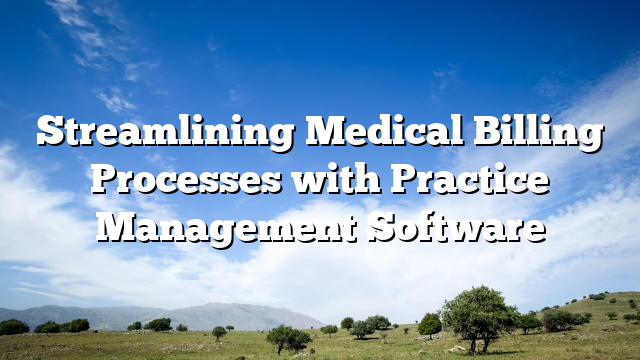Billing for medical services is an important component of any healthcare organization, and it plays a crucial part in ensuring that medical professionals are adequately compensated for their work. Yet, the process of medical billing may be difficult, time-consuming, and error-prone, which can result in payments being delayed, claims being refused, and revenue loss. A solution that may assist expedite medical billing operations, decrease mistakes, and enhance workflow efficiency is software for managing practices, sometimes known as practice management software.
Practice management software is an electronic system that automates and controls different administrative duties in a healthcare institution. These administrative chores include the scheduling of appointments, the maintenance of patient information, and the processing of medical bills. Since the program is compatible with electronic health record (EHR) systems, medical professionals are able to get patient information, diagnoses, and treatment plans from a centralized repository.
You might also like to read: Pushing the Boundaries of Healthcare Technology: How 3M is Innovating in Wound Care, Remote Patient Monitoring, and Data Analytics
One of the most important advantages of using practice management software is the fact that it makes the process of medical billing more efficient. The generation of claims and their transmission to insurance companies is simplified and expedited as a result of the software’s ability to automate these processes, which eliminates the need for the user to manually carry out these steps. The program has the ability to assist spot problems in claims before they are submitted, hence lowering the risk that claims will be refused and payments would be delayed.
Also, the program is able to assist medical professionals in more effectively managing patient information. A centralized database that only authorized people are able to access may be used to hold sensitive patient information such as medical histories, diagnoses, and treatment plans for patients. It is also possible for the software to automate the process of booking patient appointments and sending reminders to patients. This helps to reduce the probability of patients missing their scheduled appointments and ensures that patients get timely treatment.
In addition, the use of practice management software may assist hospitals and other healthcare institutions in more effectively managing their revenue cycle. The program is able to create reports that give insights into the financial performance of the firm, including income, costs, and cash flow. These insights may be useful in assisting healthcare providers to discover areas in which they may be able to cut expenses and increase income, so improving their bottom line.
You might also like to read: The Future of Healthcare: Exploring the Benefits and Challenges of Remote Care Technology
The ability of practice management software to assist healthcare practitioners in meeting regulatory standards is yet another advantage of using such software. The program has the capability to produce the reports that are necessary for compliance with a variety of standards, including HIPAA and Meaningful Use. This guarantees that healthcare businesses continue to comply with regulations and avoids the penalties that come with not complying.
Athenahealth is now one of the most well-liked practice management software alternatives available on the current market. Athenahealth is a cloud-based program that provides a variety of tools to assist healthcare businesses in more effectively managing their day-to-day business operations. Claim tracking, automatic claim filing, and rejection management are just some of the functions that are included in the software’s medical billing module. In addition to this, the software is able to create data on revenue, productivity, and financial performance. This provides healthcare providers with the ability to monitor their operations and find areas in which they may improve.
Kareo is yet another well-liked alternative for software to run a medical practice. Kareo is a web-based program that enables users to schedule appointments, manage patients, as well as handle billing and collections. The medical billing module of the program contains functions such as claims administration, payment posting, and rejection management. Kareo also has elements for reporting and analytics that may give insights into how well the business is doing financially and how satisfied patients are.
You might also like to read: How can the US healthcare system prevent medical identity theft?
In conclusion, medical billing is a crucial component of the operations of healthcare facilities, and practice management software may assist in streamlining the process, reducing the number of mistakes that occur, and improving the efficiency of workflow. Practice management software is able to assist healthcare practitioners in managing patient information, complying with regulatory standards, and more effectively managing their revenue cycle by automating administrative chores and connecting with electronic health record (EHR) systems. Providers of medical services now have access to a wide variety of software solutions, such as those offered by Athenahealth and Kareo, which may assist them in enhancing their business operations and delivering superior medical care to their patients.

Darren Trumbler is a versatile content writer specializing in B2B technology, marketing strategies, and wellness. With a knack for breaking down complex topics into engaging, easy-to-understand narratives, Darren helps businesses communicate effectively with their audiences.
Over the years, Darren has crafted high-impact content for diverse industries, from tech startups to established enterprises, focusing on thought leadership articles, blog posts, and marketing collateral that drive results. Beyond his professional expertise, he is passionate about wellness and enjoys writing about strategies for achieving balance in work and life.
When he’s not creating compelling content, Darren can be found exploring the latest tech innovations, reading up on marketing trends, or advocating for a healthier lifestyle.
